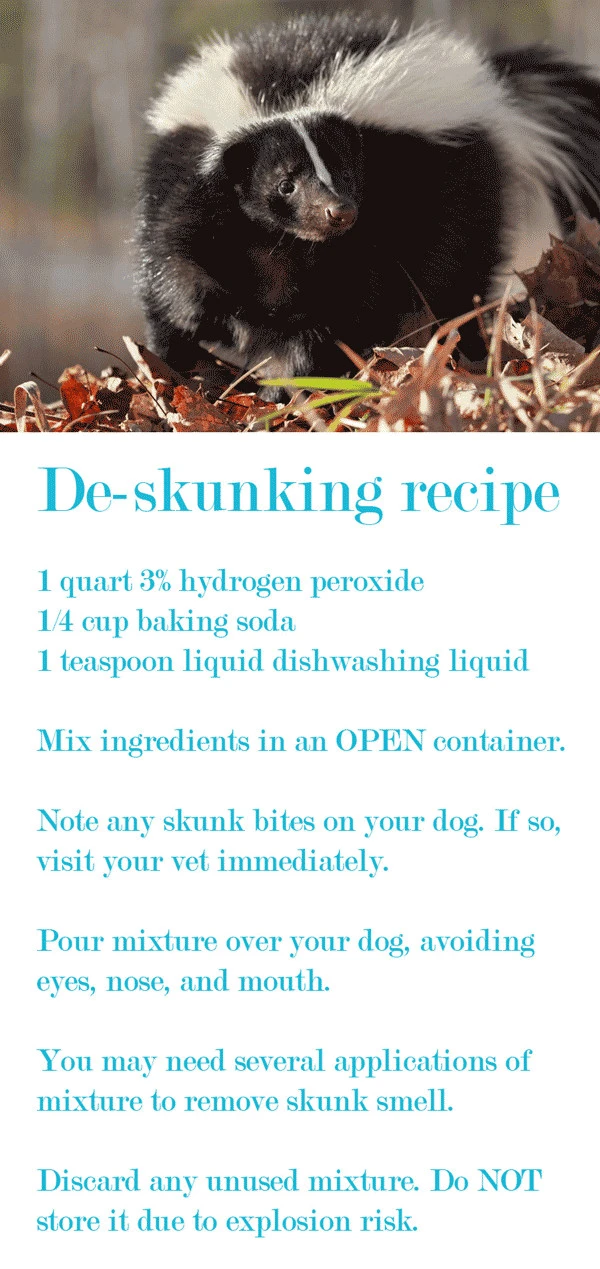Living in the country, skunks are a fact of life for us. We rarely see them, although I know they live on the hill and in the gullies on the back part of our property. I’ve never had to de-skunk our dogs but, if your dog does get sprayed by a skunk, we have some good advice in this guest post from the College of Veterinary Medicine & Biomedical Sciences, Texas A&M University.

The awful smell caused by a skunk spray is no joke. Dog owners know to keep their dog away from skunks at all costs—but sometimes Fido has other plans. With warmer weather approaching, skunks are becoming more active at dawn and dusk.
Are you prepared for a potential skunk spray?
Skunks are omnivores, meaning they eat both vegetation and meat, and they are a part of the weasel family. They are more active in the warmer months, specifically in early morning and dusk and are generally non-aggressive animals.
Although skunks typically prefer flight over fight, they are capable of spraying a substance degraded from their urine when they feel threatened.
This foul-smelling spray can reach up to 16 feet.
How to De-Skunk Your Dog
If you find your dog sprayed by a skunk, it is important to act fast.
The longer the spray sits on your dog’s coat, the worse the odor becomes and the harder it is to wash out.
First, situate your smelly pooch outside to prevent any of the substance from soaking your carpet or furniture.
Next, change into old clothes you won’t mind throwing away after bathing your dog. Be sure to grab some disposable gloves, too!
Although there are specific skunk spray shampoos available on the market, we rarely have such shampoos available on-hand at home when we need them.
In this case, Dr. James Barr, clinical assistant professor at the Texas A&M College of Veterinary Medicine & Biomedical Sciences, offered another solution.
“Although there are no specific therapies that work all of the time, the Humane Society of the United States recommends using a one quart mixture of three percent hydrogen peroxide, one-fourth cup baking soda, and one teaspoon of liquid dishwashing soap to help get the smell off the dog,” he said.
Dog owners should be careful not to add any more than the recommended amount of hydrogen peroxide, as this could burn the dog’s skin.
It is also recommended to use fresh baking soda and hydrogen peroxide to ensure effectiveness. In addition, the solution must be mixed in an open container to avoid an explosion caused by a chemical reaction.

What If Your Dog Has Been Bitten by a Skunk
Before you begin bathing your dog, be sure to check if the skunk took a harmful bite into your pooch.
In this case, you should take your dog to see a veterinarian as soon as possible.
“Dog owners need to ensure that the skunk did not bite the pet,” Barr said. “Skunks are notorious carriers of rabies, and any possible interaction with a skunk resulting in broken skin warrants quarantine.”
Was Your Dog Sprayed in the Face?
In addition, dog owners should check to see if the dog was sprayed in the face before bathing.
“Getting sprayed in the face usually does not cause many problems, but it can if enough skunk spray gets sprayed onto the pet,” Barr said. “It can cause significant irritation to the eyes, and in rare cases, severe anemia, and of course an offensive odor.”
If your dog was sprayed in the face, it is important to avoid getting the bathing mixture in their eyes, mouth, and nose.
It may be necessary to wash, rinse, and repeat several times until the smell is gone.
How to Avoid Skunk Sprays
Your pooch may regret taunting the furry black and white creature they found, but how can you be sure to avoid this situation again?
The easiest way to avoid a skunk spray is to locate areas in your yard skunks are likely to hide and fix these areas so they are no longer attractive to skunks.
According to the United States Humane Society, these areas include:
- wood and rock piles
- elevated sheds
- openings under concrete slabs and porches,
- access to crawl spaces under houses
Skunks are also attracted to garbage and pet food left out at night.
Skunks may be known for their terrible smelling spray, but these animals are easy-going in nature. Since skunks only spray when they feel threatened, it is important to keep your dog away from areas where skunks may be hiding. In addition, home-owners can decrease the likelihood of a skunk in their yard by referring to these Humane Society tips.
- Sighthound Day - September 27, 2024
- Cottage Cheese Ice Cream for Dogs Recipe - July 29, 2024
- New Dog Treat Cookbooks! - June 17, 2024
